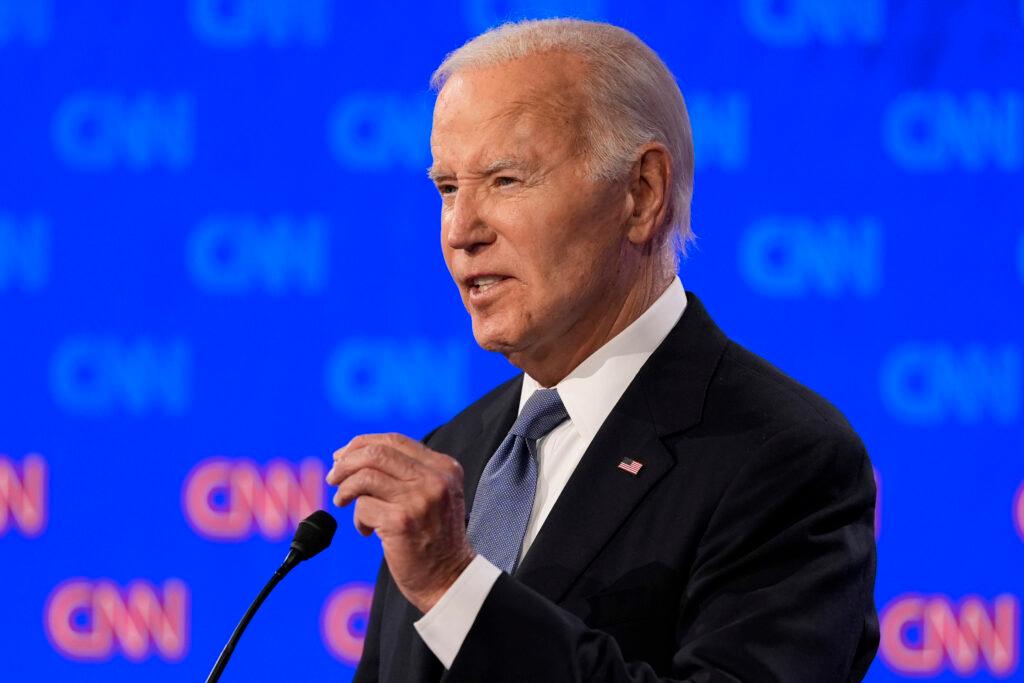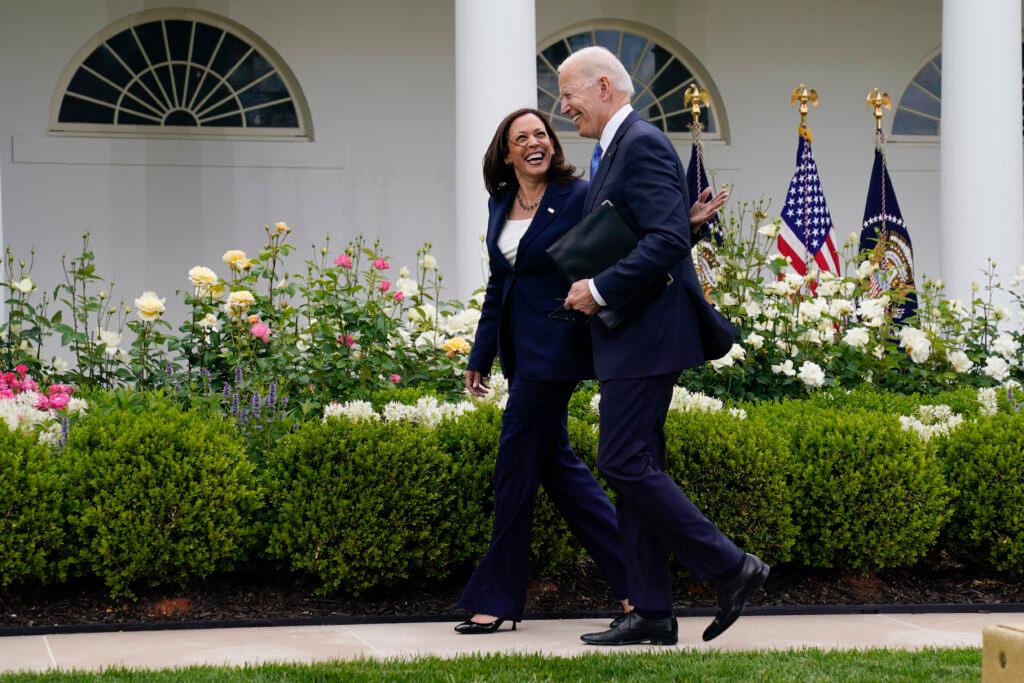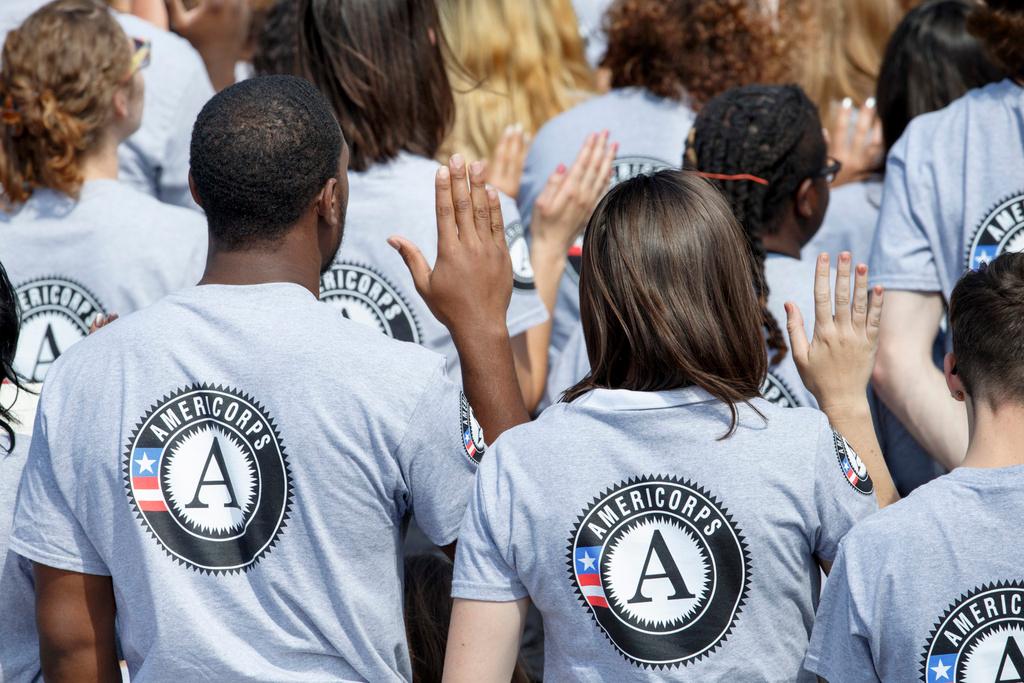
Democrats have been in a state of “controlled chaos” for weeks but are now ready to coalesce around a new leader after President Joe Biden’s weekend announcement that he would not seek reelection.
That’s the sentiment from at least one Colorado Democrat, Erik Clarke, who is also a delegate at next month’s Democratic National Convention in Chicago.
“Clearly, a Sunday midday announcement that the sitting president's not running for office is a pretty big story. So, folks are, I think, trying to understand the process and what's going to happen next,” Clarke said.
Biden issued a letter announcing his decision Sunday, and shortly after endorsed Vice President Kamala Harris to succeed him. Clarke spoke with Colorado Matters senior host Ryan Warner about the news and what he expects in the weeks between now and the convention.
This interview has been edited for length and clarity
Ryan Warner: Not long after President Biden announced he was bowing out of the race, the National Democratic Party wrote in an email, "In the coming days, the party will undertake a transparent and orderly process to move forward." Erik, from your vantage point as a delegate, is it transparent and do you feel like you have some say or some choice?
Erik Clarke: I believe it's been controlled chaos. Obviously, when something big happens, there's a lot of scrambling. Definitely an interesting experience, but folks have been doing their absolute best. The state party has been very involved in communicating things as we know things are happening. It's definitely been an interesting experience.
Warner: Controlled chaos. Who's doing the controlling and, as a delegate, do you feel like you have some say here?
Clarke: I do think so. It's been a collective effort, I think. As information becomes available either through the DNC, the Democratic National Committee and the convention team, the state party, and even information coming through the press, just recognizing that things are changing rapidly. Clearly, a Sunday midday announcement that the sitting president's not running for office is a pretty big story. So, folks are, I think, trying to understand the process and what's going to happen next. I know the rules committee, a part of the convention team, will be meeting soon to discuss process. What happens next? What's the order of operation here?

Warner: I'm interested in who you support as Biden's replacement.
Clarke: So the president endorsed his Vice President, Kamala Harris. Both Clintons, Bill and Hillary, have endorsed Kamala Harris. Well over a hundred members of Congress. The list goes on and on and I think we're even seeing some coalescence now. Since we started talking a couple of minutes ago, I think we probably have even more names added to that list.
Warner: And what about yours?
Clarke: Yeah, so I am very much leaning towards supporting the vice president. Obviously, I'm a big rules guy. I'm a process guy, so I want to see what happens next and where the rules committee stands on what the actual process is going to be for voting for a nominee. There's some conversation about whether we're still going to have this virtual roll call vote ahead of the convention or we're voting on the floor of the convention.
Warner: And some of that has to do with the timing of the states and Ohio in particular. I'm trying to picture if there's going to be a moment where Biden is perhaps on the stage at the convention in Chicago and kind of passes the baton to Harris. Do you have some picture of what that might look like?
Clarke: I'm sure there will be a big moment. The speeches are going to be very interesting. We're looking back at (the last) national convention that's been technically open, that’s 1968. That's 56 years ago, right? So, this doesn't happen every day.
Warner: Why do you support Kamala Harris?
Clarke: I think she's effective, first and foremost. Just taking a step back, look at the Biden administration. Look at the legislative record of this administration, the CHIPS Act, high-tech manufacturing jobs that are being brought to the Midwest, the focus on veterans' health care, the focus on a bipartisan national infrastructure bill that will pay dividends for our generation, something, by the way, that the former president tried to get passed and was unable to. Joe Biden's administration got it done.
Kamala Harris, former (District Attorney), former Attorney General of the biggest state in the country, U.S. senator, vice president for four years with a master class in navigating the legislature under Biden, who's been extremely effective as a senator, vice president under Obama and now president.
So, I think that she has, first of all, the experience as vice president. Secondly, these elections are binary choices, right? So, we have a former president, Donald Trump. We know what his administration looks like. We've had four years of it, and we know, through Project 2025, what the next four years would be like under his watch — concerning. We also have a sense of a vice president who's been vice president for four years in Kamala Harris and a vision for the future focused on middle-class issues, and I think rebuilding the country.

Warner: 477,000 Coloradans cast a primary ballot for Joe Biden, but now won't be able to vote for him for president. Are they well-served by these events?
Clarke: They can vote for the administration, in my view. I also think this has been a personal choice for Joe Biden. I can't imagine being in his shoes in this moment. You have to think, Joe Biden ran for president dating back to the 1980s, right? This is not his first rodeo. He ran in 2008, served as vice president for eight years, took a four-year lapse and became president, and finally was elected to office and made his mark on history. It's an incredible feat for a man who spent his entire life in public service since the age of 29 in the U.S. Senate, who was the most powerful person in the world, President of the United States, and then taking a step back and saying, "We are in an existential crisis. Donald Trump is a danger to the country, a danger to our constitutional republic. It is in the best interest of the country for me to give up power in this moment." That is a remarkable, patriotic thing for anybody to do. I can't imagine the former president would've done the same.
Warner: Do you greet the day feeling better about Democrats' chances than you did, for instance, on Saturday night?
Clarke: So, I think we have a direct shot at winning. I truly do. I think the swing states are pretty clear at this point. I think we have an opportunity to carry the day. I also look at this election almost in two parts. We have a pre-Biden dropout section where we have polls that looked rough. It looked like a rough ride forward to win the election. Today, post midday Sunday, we have a very different kind of race in front of us. I view it as a fresh start. What has been is no longer, and we're going to see where this race takes us.
Warner: If Kamala Harris is indeed the candidate, what would you like to see in a vice president? Should that person come from a swing state? I think you grew up in Ohio.
Clarke: Well, former swing state.
Warner: Yeah.
Clarke: It was when I was growing up. It was definitely a purple state. First of all, because we have the luxury of understanding who Donald Trump's vice presidential choice is, also from Ohio, by the way. U.S. Senator JD Vance: 39 years old; some experience — and I do mean some, sparingly in the U.S. Senate; not a lot of accomplishments behind him on the political front; definitely some interesting ties to (venture capital) firms in Silicon Valley. It's pretty clear where he stands on what's important to him and whose interests are important to him. So, I think we have a pretty good palette to understand how we can build a real conversation.
First of all, I definitely view experience as a must for our next vice president, and I hope (Harris) would choose somebody who's experienced. I think there are a number of good options, both as governors, within the cabinet, within the U.S. Senate. I think there are plenty of good options for her.
Warner: Any names you'd like to drop? Anyone you're hoping for?
Clarke: Sure. I think that we have, especially on the governor front, some interesting names. Governor of North Carolina (Roy Cooper), governor of Pennsylvania (Josh Shapiro), governor of Michigan (Gretchen Whitmer) would be interesting. Clearly, our Secretary of Transportation, Pete Buttigieg would be interesting. I think very core to the argument is somebody who can help, first of all, win the election, but also govern responsibly. Our political climate's interesting — it's been interesting since 2016, since 2015. There's been a lot of division, the reliance on competence in government. I think folks who I'm hearing on the ground are really interested in a government that's boring again.
Warner: Boring government.
Clarke: Boring government focused on issues that matter to their everyday lives. I do believe that having a competent governor or senator who just gets the job done would be a big asset for Kamala Harris.
Warner: So, I suppose you're MABA, Make America Boring Again.
Clarke: Make America Boring Again. Make our government boring again.
Warner: As someone born and raised in California who moved to Colorado two decades ago, I am keenly aware of some Coloradans' distaste for California. Do you think Harris' Californian-ness may cost her in Colorado and potentially jeopardize down-ballot races?
Clarke: No.
Warner: Why?
Clarke: No, period. I don't think it's relevant. I don't think it's a relevant question. Kamala Harris has shown for the past four years how she behaves as vice president focused on issues. I think we're going to get a sense in the coming days and weeks where she stands on national issues and how she puts herself forward now as a presidential candidate who's the very likely nominee of the party.
Warner: It can be exhausting to live in such historic times from a pandemic to an attack on the Capitol, to climate change, to an assassination attempt, to now seismic shifts on the Democratic ticket. How are you doing and how do you cope?
Clarke: How is America doing? I just shared this on my own social media. I think folks are really revved up, sometimes in a good way, sometimes in a not so good way. It's a stressful world we're living in and folks online are living in a bit of a bubble in an echo chamber, and the algorithms are designed to keep people engaged and sometimes they see some pretty negative stuff. My best advice is go out and touch grass, get into nature, get offline for a little bit, and reground yourself. It is a complex world we're living in right now, not just the political culture, but like you said, climate change is bearing down on us. We have some pretty catastrophic wars happening regionally across the globe, both in Israel and the Middle East as well as in Eastern Europe with the Ukraine-Russia conflict.
Warner: The grass. Yeah, and you're grassroots. So, there we go bringing it back home to politics. Erik, thank you for being with us. Appreciate it.
Clarke: Thanks for having me.
- With Biden out of the presidential race, Colorado Democratic delegates talk about who might replace him
- Colorado lawmakers praise Biden. Polis endorses Harris as Democrats rally around the VP
- Should Biden stay in the race? Colorado voters weigh the options
- Colorado Rep. Brittany Pettersen calls on Biden to drop re-election bid
- Sen. Bennet says Biden ‘cannot win,’ warns of Trump landslide








